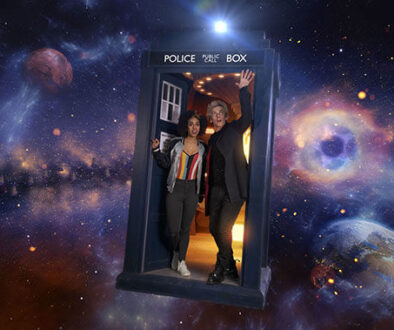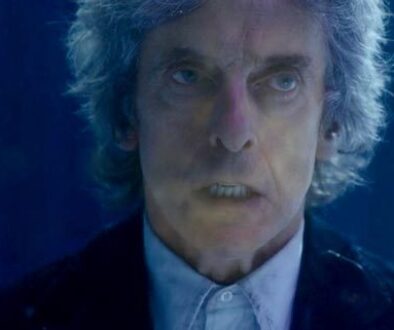Series 10: The Lie of the Land Review
Clint Hassell gives his verdict on the eighth episode of Doctor Who Series 10.
Note: this review contains full spoilers for episode 8 of Series 10.

Hey, Clint! You’re typing in bold, again. Does that mean Series 10 is over? Is it time for your annual “Questions, Questions” article?
Um . . . no. I liked “The Lie of the Land,” when I first saw it, but, having seen it multiple times, over several days, and having the opportunity to mull over the episode’s intricacies, I’m . . . conflicted. My inner fanboy wants to write a more positive review than the professional critic will allow, and the analytical essayist in me sees the episode’s strengths, yet can admit that parts of the story are underdeveloped.
OK, you’re at odds and you need to talk through some things. We’ve done that before, with the “Detained” episode of Class – –
– – which is one of my best articles! (here)
Yeah, because of me.
No, because I’m better able to examine multiple sides of an argument.
By talking to yourself. Which isn’t crazy at all. But, OK. Let’s get started. What did you think of the pre-credits teaser?
The intro feels like “Turn Left,” with Bill, like Donna Noble before her, forced to watch as neighbors are pulled from their homes and sent to camps.
While “The Lie of the Land” has less time to explore the idea than “Turn Left,” it is still effective, as presented. In fact, the central concept of “Turn Left” – – that, without the Doctor’s protection, the world slips into fascist desolation – – permeates “The Lie of the Land.” That’s cool, no? We need to be reminded, every few series, exactly how important the Doctor is to Earth, in particular. And, considering that the Doctor is currently confined to Earth, the story is especially appropriate for Series 10.
True . . . it’s just that the rest of the episode then feels eerily reminiscent of the three-part Series 3 finale.
 In fairness, any story involving a companion as the lone resistance fighter against a world-subjugating force will share some similarities to “Last of the Time Lords.”
In fairness, any story involving a companion as the lone resistance fighter against a world-subjugating force will share some similarities to “Last of the Time Lords.”
Yes, but this seems especially close. Being smuggled around the world. Having to free the Doctor.
Minority companion. An alien companion who contributes little to the plot.
A resolution that requires the world’s population to believe the truth. Is there any other way to write a story like this? Probably not.
“Day of the Moon” also covers much of this ground.
Exactly! Still, this feels like . . . not a “rehash,” per se . . .
But a “remake”?
That’s probably a good analogy.
Is that bad? Hollywood remakes movies all the time. Surely, after 10 years, it’s OK to revisit a storyline from Series 3!
Yes, and I realize that, if no plot points were ever repeated, the characters’ actions would lack consistency and cause plot logic to suffer. It’s just that “The Lie of the Land” didn’t feel “new.” It wasn’t reconceived enough.
Do you think this is scriptwriter Toby Whithouse’s fault?
What?! No! Shut up! We love Toby Whithouse!
 Um, no. You love “School Reunion,” and “Greeks Bearing Gifts,” and “The God Complex,” and “Under the Lake,” but you thought that “The Vampires of Venice,” “A Town Called Mercy,” and “Before the Flood” were just OK. Basically, the guy alternates between “fantastic” and “serviceable.” He’s your new Mark Gatiss.
Um, no. You love “School Reunion,” and “Greeks Bearing Gifts,” and “The God Complex,” and “Under the Lake,” but you thought that “The Vampires of Venice,” “A Town Called Mercy,” and “Before the Flood” were just OK. Basically, the guy alternates between “fantastic” and “serviceable.” He’s your new Mark Gatiss.
WHAT?! That’s craz – – Oh, man, you’re totally right. So, why am I excited when I hear that Toby Whithouse has authored a script, but cautious when it’s a Gatiss offering?
Because nothing Whithouse has written has missed the mark as completely as “Sleep No More” or “Robot of Sherwood,” or been as inane as “The Idiot’s Lantern.”
Fair enough. Still, you gotta root for Gatiss. He’s such a fan.
Yes, and poor Whithouse got stuck writing the final episode of a three-part story.
To his credit, he realized that there was no way to sensibly explain Nardole suddenly reappearing as alive, much less healthy, so he quickly dismisses the occurrence with a two-line explanation.
 Which is about all it deserves! But, I digress. What are some other things that you liked about the episode?
Which is about all it deserves! But, I digress. What are some other things that you liked about the episode?
There were some subtle things: everyone being forced to wear dark, teal green jumpsuits, while the soldiers that worked with the Monks wore dark red. I liked that Bill’s new apartment is stark and white, with the shelves by the front door pointedly empty. Has she not unpacked? No – – the Monks have confiscated all non-approved material. Note that there is still a painting, but it now features a Monk.
All of those things can be attributed to an inspired costumer designer or an observant set decorator. What about Whithouse’s script?
Well, that’s where I start to struggle. Take the opening teaser: why would the Doctor participate in making propaganda videos for the Monks?
That’s easy: exposition. That teaser catches the audience up on the first two-parts of the story. It’s creative. Further, convincing the audience that the Doctor is cooperating with the Monks makes his “regeneration” scene, later in the episode, more believable. Within the narrative, the Doctor is seemingly cooperating with the Monks as cover for his resistance efforts.
I get all of that, but the Doctor is actively working against his own interests, later in the episode. Maybe, I would care less, if the Monks were better developed as villains. After three episodes, we still have no idea of why they invaded Earth! Do they want our resources? Are they just generically evil?
The camps to which they exile memory criminals hint that they wanted to use humans as slave labor.
For what purpose? Why the fascination with pyramids? Why is there seemingly no alarm on the control room? Several minutes pass, after the Doctor tries to sabotage their system; why isn’t the room flooded with Monks?
I think we’re to assume that the soldiers outside are defending the control room. Perhaps the Monks were overconfident, considering their repeated victories in their simulations?
And, their powers seem dictated by plot. They can alter reality to heal the Doctor’s eyes. They can shoot electricity. They can create coral-esque constructs to use as shields. They can alter memories – – but not imagined memories.
 Well, they don’t so much “alter” memories as make you ignore them. Like a perception filter, but for your nagging thoughts. Maybe it’s not effective against fabricated memories because imagining something is an active process, while remembering something is more passive.
Well, they don’t so much “alter” memories as make you ignore them. Like a perception filter, but for your nagging thoughts. Maybe it’s not effective against fabricated memories because imagining something is an active process, while remembering something is more passive.
I’d . . . I’d actually accept that! That’s a really good explanation.
Thanks. Anything else bothering you that I can explain away?
Why does no one think to use the TARDIS to rescue the Doctor or to invade the Monks’ command center?
Um . . . because using the TARDIS would make defeating the Monks too easy?
You’re not helping.
Yeah, sorry. I got nothin’. I was wondering this, too.
In “The Last of the Time Lords,” Martha is forced to wander the Earth over the course of a year, because she doesn’t know how to fly the TARDIS, but, in “The Lie of the Land,” Nardole does, and he’s in possession of it! I understand that Whithouse is purposely trying to not take the easy way out, but I wish he’d included a line of explanation like, “I contaminated the TARDIS with virulent bacteria, and now she’s angry and won’t even open her doors for me!” Heck, that would even explain the grinding noise the TARDIS made, when Nardole tried to pilot it, in the last episode.
Consider this: the Doctor had reason to suspect that Bill might be under the Monks’ influence. Perhaps, he asked Nardole to not take Bill inside the TARDIS for fear that the Monks’ might gain control of the ship.
Hmmm . . . . And why didn’t they use the TARDIS to infiltrate the Monks’ headquarters?
 No idea, aside from the TARDIS ostensibly being wherever Nardole parked it, and not in Scotland. It’s not a perfect explanation. The episode could use a line or two of exposition to better explain this specific plot point. Speaking of Scotland, what were your thoughts on the regeneration scene?
No idea, aside from the TARDIS ostensibly being wherever Nardole parked it, and not in Scotland. It’s not a perfect explanation. The episode could use a line or two of exposition to better explain this specific plot point. Speaking of Scotland, what were your thoughts on the regeneration scene?
The scene is marvelously acted, and almost fools you. The dialogue is so dynamic that the revelation that the entire scene is a ruse doesn’t undermine its effectiveness. I particularly love that it’s the first moment where we see Bill rise to the challenge to do the smart, courageous thing, in a moment of crisis. It is here she earns her companion status, not for who she is, but for what she does.
Yes! Note how her actions reinforce the theme that the Doctor makes weapons of his companions, who are exposed to so much strife and hostility that they become exceedingly skilled in warfare.
We haven’t touched on that, this series. To be honest, I didn’t expect Bill’s character to play into that theme.
 I think this is an important comparison between Bill and previous companions, especially in a series where Bill has so often been contrasted to the Doctor’s former assistants.
I think this is an important comparison between Bill and previous companions, especially in a series where Bill has so often been contrasted to the Doctor’s former assistants.
One question: “Good bye, Doctor. Thank you. God, it was worth it.” Was it really? As far as companion tenures go, Bill’s hasn’t been the best. Over the course of at least a year-and-a-half, she’s had only two trips through spacetime – – including a terrifying trip to a space station where she was twice almost killed – – and six months of hellish subjugation by alien Monks.
Yes, but, again, Series 10 has repeatedly hinted that Bill has little imagination. This is an aspect of that. Bill’s first adventure in the TARDIS involved more adventure than she could ever have dreamed. Compare this to Rose, or Amy, or Clara – – or, heck, even Adam – – all of whom were defined by wanting more from life. I think the farewell scene between Bill and the Doctor is touching, because it paints Bill as normal. She’s not a ready-made companion.
Neither was Adam, and look how that turned out.
Yes, but Adam’s tenure, short as it is, helps define what makes a companion. As disliked as his character is, his story is pivotal in outlining the role for the modern era, even if it is done in contrast. Consider that they are again defining the companion role by contrasting Bill against what has come before.
So, given the similarities between the plots of “The Lie of the Land” and “Last of the Time Lords,” is Bill the new Martha?
 No. Martha saved the Earth by herself, and Bill still needed the Doctor and Missy to show her how. I’d say a better comparison is that Bill is like Donna, considering both were willing to commit suicide to ensure a better reality for the world around them.
No. Martha saved the Earth by herself, and Bill still needed the Doctor and Missy to show her how. I’d say a better comparison is that Bill is like Donna, considering both were willing to commit suicide to ensure a better reality for the world around them.
How do you feel about Bill’s “death”?
Oh, Bill totally should have died. That much power coursing through her brain should’ve killed her, regardless of whether or not her plan worked.
I’m less bothered by the fantasy physics, and more upset that the episode once again taps the well of companion “death.” It’s such a cheap maneuver.
It’s not like the scene is without emotion, with a normally stoic Capaldi barely restrained.
And a replay of the scene where the Doctor gives Bill photos of the mother she never met? That scene already made me tear up, once!
 How fantastic is it that a plot point from seven episodes ago becomes pivotal, in “The Lie of the Land”?
How fantastic is it that a plot point from seven episodes ago becomes pivotal, in “The Lie of the Land”?
Suddenly, it makes sense why “Oxygen” pointedly showed that, in her final moments, Bill looked to her mother – – it was foreshadowing for this episode.
I’m loving how every episode in series 10 makes multiple references to others in the series. Despite being scripted by different writers, each episode adheres to Series 10’s overarching theme. Showrunner Steven Moffat should be given a lot of credit; not even Series 6, which seemed to revolve incessantly around River Song’s backstory, was this tightly scripted. As much as I hated not having a full series of episodes, in 2016, I’d gladly wait an additional year to have Series 11 be this satisfying.
That’s a bold statement!
Cut to me, in six months, lamenting the long wait for Chibnall’s Series 11. How did you feel about the episode’s denouement?
Frustrated. The Doctor explains that no one remembers being invaded, because the Monks mindwiped humanity as they left – –
– – a brilliantly sensible ending, which leaves open the possibility of reinvasion – –
– – but then the Doctor ties that explanation into his repeated message that humans dismiss the fantastic events that happen around them, which muddles the plot point.

I love that the Doctor’s words of praise mean something to Bill.
Yeah, I wonder how much of a surrogate dad he has become, to her. That’s not a role the Doctor has played, in the modern era.
I predict a heartbreaking response from her, as he regenerates.
Assuming she makes it that far.
Well, we foreshadowed her seeing him regenerate, in “Knock Knock.”
True, but maybe that was just setting up his fake regeneration in this episode?
Oh, yeah, that could be possible.
If nothing else, “The Lie of the Land” explains Peter Capaldi’s claim to have already filmed a regeneration scene for Twelve that isn’t as “straightforward” as expected, and why he would continue to film, despite ostensibly being replaced by another actor.
It’s like a good teaser – – technically true, but only just enough so as not to not spoil what is coming.

“I’ve had adventures, too. My whole life doesn’t revolve around you.” Man, do I want to see that spin-off series!
The line is subtle, but sells the idea that the Master isn’t completely evil. Further, it’s sensible that the Master would flee Gallifrey and the constant sound of drums, by throwing himself into a series of adventures.
“Your version of good is not absolute. It’s vain, arrogant, sentimental. And if you’re waiting for me to become all that, I’m going to be here for a long time yet.” Imagine examining the innerworkings of Doctor Who by contrasting a standard episode against one where the typically noble Doctor is replaced by an antiheroic Master.

And yet, Missy was only in one scene, this episode!
Well, and the epilogue.
I expected the Doctor to free Missy from the vault, and for the two of them to defeat the Monks, together, before Missy double-crosses the Doctor and escapes.
I think a lot of people did.
Still, I’m trusting Moffat’s plan. This episode certainly seems to lay the groundwork for some stunning character development, in Missy’s later appearances.
So, it sounds like you feel more resolved about “The Lie of the Land.”
I do. Though I wish some of the specifics of the plot were better explained, the episode feels appropriately apocalyptic and continues Series 10’s use of an ordinary Bill to explore the extraordinary role of the companion within the series. I’d say I’m happy, overall. Thanks for talking through this with me.
I’m glad I could help. (P.S. Whithouse is still your Mark Gatiss.)
Shut up!








